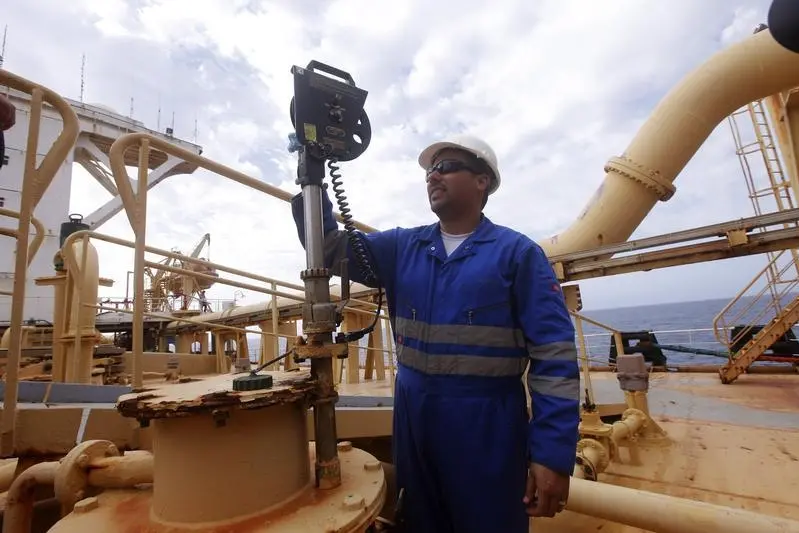PHOTO
LONDON - Glencore is keeping the marketing rights for the Sarir and Messla crude grades for a third year even though BP and Shell are returning to lift Libyan oil in a sign the country's industry is perceived as becoming more reliable, sources said.
One source familiar with the matter said Libya's state oil firm National Oil Corp (NOC) had allocated its 2018 crude and that the contracts would be signed next week.
With production having steadied at around 1 million barrels per day (bpd) since the middle of last year, Libya, beset by factional fighting, has become a less unstable supplier.
However, supply risks remain. One pipeline bringing Es Sider crude to export was recently bombed but swiftly repaired.
BP and Shell declined to comment. Spokesmen for Glencore and the NOC did not immediately respond to requests for comment.
Last August, Shell directly lifted its first cargo of Libyan crude in five years.
Since the end of 2015, Glencore has been the sole marketer of the Sarir and Messla grades, which are produced in the east of the country and exported via the Hariga port.
Glencore was one of the few traders willing to deal with the risks associated with Libya's unrest, Islamic State intrusions and a crippling port blockade that slashed the country's output.
Earlier this month, the NOC said it was seeking a prompt restart of the country's largest refinery at Ras Lanuf, following a resolution to arbitration cases with its operator, Lerco.
The refinery, closed since 2013, runs on the grades allocated to Glencore. It was not immediately clear when the refinery would resume operations or what would happen to Glencore's allocation once it does.
NOC subsidiary Arabian Gulf Oil Co produces the Sarir and Messla grades. Output has been fluctuating between around 150,000 and 230,000 bpd, its chairman said in early January, below its potential 320,000 bpd owing to power problems.
Other contract winners include Vitol, Total, Unipec, OMV, BB Energy, Eni, API, Cepsa, Socar and Repsol, trading and shipping sources said, largely unchanged from 2017.
(Additional reporting by Dmitry Zhdannikov; Editing by Dale Hudson) ((julia.payne@thomsonreuters.com; +44 207 542 1836;))
One source familiar with the matter said Libya's state oil firm National Oil Corp (NOC) had allocated its 2018 crude and that the contracts would be signed next week.
With production having steadied at around 1 million barrels per day (bpd) since the middle of last year, Libya, beset by factional fighting, has become a less unstable supplier.
However, supply risks remain. One pipeline bringing Es Sider crude to export was recently bombed but swiftly repaired.
BP and Shell declined to comment. Spokesmen for Glencore and the NOC did not immediately respond to requests for comment.
Last August, Shell directly lifted its first cargo of Libyan crude in five years.
Since the end of 2015, Glencore has been the sole marketer of the Sarir and Messla grades, which are produced in the east of the country and exported via the Hariga port.
Glencore was one of the few traders willing to deal with the risks associated with Libya's unrest, Islamic State intrusions and a crippling port blockade that slashed the country's output.
Earlier this month, the NOC said it was seeking a prompt restart of the country's largest refinery at Ras Lanuf, following a resolution to arbitration cases with its operator, Lerco.
The refinery, closed since 2013, runs on the grades allocated to Glencore. It was not immediately clear when the refinery would resume operations or what would happen to Glencore's allocation once it does.
NOC subsidiary Arabian Gulf Oil Co produces the Sarir and Messla grades. Output has been fluctuating between around 150,000 and 230,000 bpd, its chairman said in early January, below its potential 320,000 bpd owing to power problems.
Other contract winners include Vitol, Total, Unipec, OMV, BB Energy, Eni, API, Cepsa, Socar and Repsol, trading and shipping sources said, largely unchanged from 2017.
(Additional reporting by Dmitry Zhdannikov; Editing by Dale Hudson) ((julia.payne@thomsonreuters.com; +44 207 542 1836;))





















